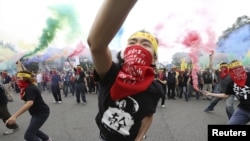Protesters calling for Taiwan not to join the China-led Asian Infrastructure Investment Bank clashed with unidentified men in black T-shirts outside a meeting of officials from the two administrations on a Taiwanese island on Saturday.
Police held back up to 70 banner-waving activists, mainly from a Taiwanese pro-independence party, some of whom were kicked and punched by the men, media coverage showed.
The Taiwan Solidarity Union, which organized the rally, accused China of being behind the attacks, without going into further detail. Chinese state media coverage of the meeting did not mention the clashes.
Anti-China activists have launched regular demonstrations in Taiwan in recent months, saying they fear economic colonization from the mainland after nearly a decade of slow rapprochement between the historic enemies.
In an apparent acknowledgement of the tensions, Taiwan's top China policy minister, Andrew Hsia, told his Chinese counterpart, Zhang Zhijun, that any improvement in ties would need public support.
Zhang invited Hsia to China for a visit, without giving details of a venue or date, a sign that the prolonged talks would continue.
"We hope the mainland side can truly understand and realize that only on the basis of dignity, respect, peace and security can cross-strait relations have lasting stability," said Hsia, minister of Taiwan's Mainland Affairs Council, in his opening remarks. "The key to the future of cross-strait relations lies in public support."
"Both sides should be determined to protect cross-strait relations from U-turns and setbacks, which are also the common aspirations of compatriots across the Strait," said Zhang, China's Taiwan Affairs Office director, according to the official Xinhua News Agency Saturday.
The heads of the two government offices in charge of cross-strait affairs have now met four times since their first session in early 2014.
Taiwan's President Ma Ying-jeou, who is in the final year of his second four-year term, has overseen the signing of several pacts aimed at building economic ties in sectors ranging from finance to tourism.
Opponents in Taiwan launched a "Sunflower" protest movement after accusing Ma of trying to ram through legislation for a far-reaching services-trade pact without public consultation in March of last year.
Before the pact could become law, hundreds of protesters, mostly young Taiwanese, forced their way into Taiwan's parliament and repelled police efforts to evict them.
China regards Taiwan as a renegade province and has not ruled out the use of force to take it back, particularly if the island makes a move toward independence.





